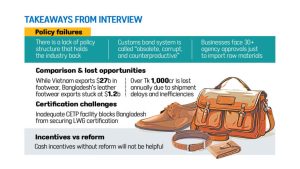The country’s leather footwear sector has the raw materials, skilled labour and a strong place in the global supply chain. Still, exports have long remained a sleeping giant due mainly to a lack of trust in local entrepreneurs and a system riddled with flaws, according to Md Nasir Khan, chairman of Jennys Shoes. While leather footwear exports by neighbouring Vietnam have surged to $27 billion, Bangladesh remains stuck at $1.2 billion. Khan said this sector should already have crossed $10 billion in exports.
“We have everything, leather, labour, logistics. What we do not have is a policy structure that allows us to grow,” he said in an interview with The Daily Star.
“It is not a lack of talent. It is a lack of trust in our entrepreneurs and a broken system that rewards paperwork over performance,” said Khan, also the vice-president of the Leathergoods and Footwear Manufacturers and Exporters Association of Bangladesh.
 During the interview, he described how policy failures, red tape and missed opportunities have kept leather footwear from becoming one of the country’s export success stories.
During the interview, he described how policy failures, red tape and missed opportunities have kept leather footwear from becoming one of the country’s export success stories.
At the centre of his criticism is the customs bonded warehouse system.
Introduced more than 30 years ago, it was meant to allow duty-free imports of raw materials for export industries.
Khan called it “obsolete, corrupt, and counterproductive” in today’s fast-moving trade environment.
“This system is like trying to run 5G through a dial-up modem,” he said.
To get a bond licence, the shoemaker said businesses need to collect documents from as many as 31 different government agencies.
Even then, importing raw materials requires item-by-item approvals, capacity certificates and repeated filing of in-bond and out-bond records, often by hand, he said.
“You apply to import 100 units. They approve 50. You export using those 50, then reapply, wait again. This is not a trade facilitation, it is a trade controller,” said the chairman of Jennys Shoes.
Jenny exports mainly to Japan, Italy, Germany, France and the United States. In the US market, it supplies only non-leather sports shoes. Skechers and Steve Madden are among its biggest buyers, placing regular large orders.
Referring to industry estimates, Khan said that between Tk 50 crore and Tk 100 crore is spent each year on maintaining bond-related infrastructure and manpower. Over Tk 100 crore goes on unofficial fees, while more than Tk 1,000 crore is lost annually to shipment delays and bureaucratic inefficiency.
“And this is all for a system that barely prevents leakage,” he added.
Vietnam, he said, has reached $27 billion in leather footwear exports with simpler rules and stronger local value chains, despite starting later compared with Bangladesh and without its own raw materials.
Now the shoemaker advocated for phasing out the bond system and replacing it with a value-addition model.
He believes this would allow businesses to import raw materials freely, provided they ensure a minimum share of local value addition, around 20 to 25 percent, before exporting.
“If I know I must retain 25 percent value locally, I will invest in local materials. I will work with local suppliers. But right now, I spend more time managing paperwork and bribes than managing production,” he said.
“Such models are already followed in other export economies, shifting the focus from compliance policing to economic performance.”
Despite producing high-quality leather, Bangladesh exports more than 75 percent of it in semi-finished form, mainly to China and India, because it has failed to meet international environmental standards.
A key barrier is the central effluent treatment plant (CETP) at the Savar tannery estate, which has never functioned properly. Consequently, the sector cannot obtain globally recognised certifications such as the Leather Working Group (LWG) standard. Without it, exporters cannot access premium markets or meet the demands of environmentally conscious buyers.
“We spent thousands of crores building the leather park. But without functioning compliance, our own manufacturers cannot use our leather. Global buyers would not touch it. So, we import leather just to export products made with it,” Khan said.
Calling this “a tragedy”, he added that countries, including France, had offered to help Bangladesh set up a certification framework free of charge, but indecision at the policy level blocked progress.
For two decades, the government has provided cash incentives of 10 to 15 percent on export earnings. Yet growth has been negligible.
According to the shoemaker, it is like giving grapes to a patient who needs heart surgery. “You cannot fix a broken system with sweeteners.”
He argued that incentives only entrench inefficiency if the system itself is broken.
“We have had 15 percent incentives for two decades, but we are still at $1.2 billion in exports. Clearly, the problem is structural, not financial.”
Unless the government shifts from regulation to facilitation, Khan warned Bangladesh risks losing out on the next wave of industrial leadership.
He outlined the steps he believes are urgent.
Those include replacing the bond system with a value-addition model, setting up functioning LWG certification for the sector, reducing dependence on bureaucratic approvals, digitising and decentralising customs clearance, promoting local sourcing and expanding opportunities for small and medium enterprises.
“We do not need aid. We need smart policies,” he concluded.
Source: The Daily Star


